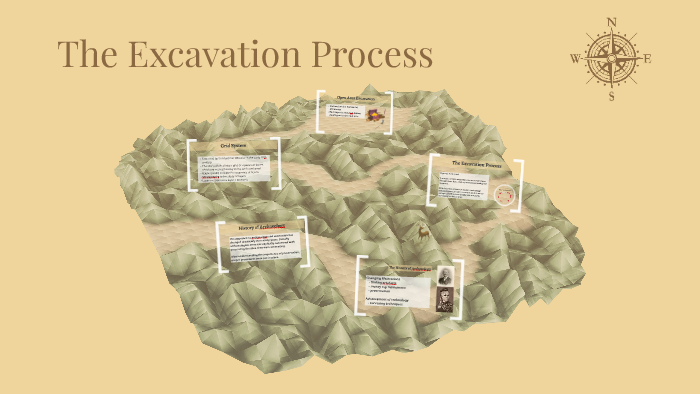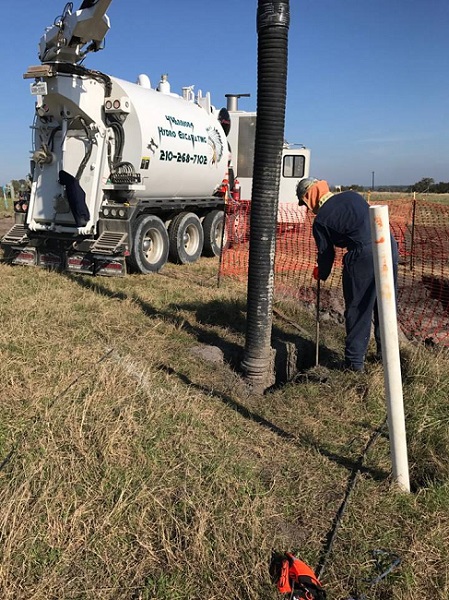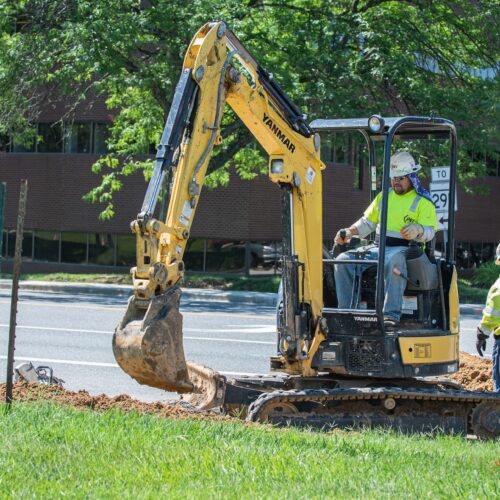What Does General Contractor Do?
Wiki Article
Not known Incorrect Statements About Demolition
Table of ContentsGeneral Contractor - An OverviewThe Only Guide for Concrete ContractorsThe smart Trick of Excavation Contractors Near Me That Nobody is Talking AboutHow Grading Contractors can Save You Time, Stress, and Money.Fascination About General Contractor


Scrapers or Pans excavate soil in one area, haul as well as dump the dirt in another spot (excavator). It is difficult to match the performance of scrapers for cut/fill soil procedure if the haul range is much less then a mile. Scrapers are generally pulled by a rubber tire wheel tractor and are sometimes pushed with the cut location by a bulldozer.
There are sometimes that scrapes are not utilized for site grading and a dump truck is used: the haul might be to long, the haul might go across roads where scrapes are not allowed, acid rock may be come across, devices schedule, and so on. Unload vehicles are in usual usage as well as possibly call for little conversation.
"Rock body" beds, on the various other hand, have no tailgates as well as can unload any type of dimension rock, although their quantity capability is decreased. Compaction Equipment raises the thickness of the dirt and in some situations gives a smooth, rolled surface.
General Contractor Fundamentals Explained
From a simple examination pit to percussion drilling to core exploration the owner has significantly a lot more expensive choices that generate increasingly far better information regarding the website underground. The Owner on a 100,000 SF structure job may authorize twenty boring areas with split spoon soil samples taken up until rock is reached and then core samples of rock.Knowing the type and also top quality of rock (from the core examples) as well as area of rock (from the dirts boring) is a genuine advantage in jobsite planning. Alternatively, the Proprietor of a 100,000 SF building might choose to wage no geotechnical screening whatsoever. The decision about geotechnical testing is generally made by a Proprietor without any input from the Construction Manager.
A knowledge of the approximate area of the rock assists the Building and construction Supervisor to intend the sequence of actions following rock excavation. If rock is in one edge of a big structure task, for instance, the planet excavation could begin at the opposite end of the building in order to begin structure job soonest.
Starting the foundation job early would be a good concept if the rock could be eliminated by tearing. Nonetheless, if the rock is exceptionally difficult as well as requires considerable blasting, it might be prudent to hold structure work up until the blasting is completed. The Construction Manager ought to collaborate these sorts of decisions as well as utilize all the technological day readily available.
About General Contractor
Unclassified excavation specifies that all rock or other unanticipated materials (excluding harmful materials) encountered in the sitework will be the duty of the Specialist at no adjustment in contract expense. An unidentified excavation is simpler from a book-keeping point ofview and positions the duty for geotechnical conditions onto the Sitework Service provider.It's remarkable what a heavy rain can do to a building task. Prior to the rainfall, the website may be completely dry, hefty equipment successfully relocating earth, the other professions efficiently executing their work.
In a lot of locations of the globe, the Construction Manager should keep in mind a simple fact: IT WILL RAIN. Good planning can reduce the damages as well as interruption of a hefty rain to a jobsite. Frequently the excavation as well as grading is delegated the Sitework Service Provider (and also their Foremen is liable to manage as well as direct the hefty tools and also drivers).
The Building and construction Manager have to be continuously aware of what rainfall will certainly do to the job site. It is not unusual for the Sitework Foreman to function their heavy equipment for optimal effectiveness and also wish it doesn't rainfall. One of the very best ways to plan for rain is to slope all qualities to drain pipes as well as to smooth rolled the surface area before a rain.
The Main Principles Of Mini Excavator
The Construction Manager should be perceptive enough to insure that hefty rainfall does not quit working on the project much longer than necessary. Daily discussions with Sitework Foremen may be called for to achieve this goal. At any time excavation is called for listed below the existing aquifer on a task, the procedure of dewatering should be thought about.In a genuinely natural soil, the water travels so slowly with the clay or silt that dewatering is not generally needed for the relatively short time of excavation. Dewatering may be required for a single ground excavation or for an click here to read entire job site. The most common dewatering methods are trench drains pipes, deep wells and also well points.

Ground water infiltration can additionally be reduced by cutoff approaches such as sheet piling. High dewatering prices have actually paled the profit margins on far as well many tasks.
This choice should constantly be thought about when analyzing the prospect of dewatering. Clearly the option is only feasible if gravity can run the water to reduced ground. Trench drains pipes can be cut with a backhoe and full of a coarse, granular material (# 4 stone for example), however treatment must be worked out in choosing the water outlet type and also location.
How General Contractor can Save You Time, Stress, and Money.
A siphon, necessarily, utilizes air pressure to lug water from one elevation, up over a barrier, to a reduced elevation. The useful content pipelines in a siphon system should be airtight as well as some ingenuity is often called for to completely load the siphon pipe. The siphon pipeline must be full for the siphon to start.A deep well includes a pump, hose and also an upright well casing. The pump intake is at the base of the well covering (normally some crushed stone is put there as a filter medium) (excavation contractors near me). The water is pumped up the tube, out of the well housing, and also to an appropriate discharge location.
In a rugged sand, for instance, a large location can be pumped to near the pump consumption elevation. A less absorptive soil, on the other hand, minimizes the effectiveness of a deep well. Considering that the pump is usually at the bottom of the deep well, there are no height restrictions due to vacuum lift, as well as deep wells can reduce the groundwater over 50 feet.
Under of the wellpoint there is a 2 foot long screen as well as shutoff, water jets out of this shutoff and produces an opening into which the wellpoint pipeline can be lowered. This hole is frequently check my site made a bigger diameter (as an example 10 inches) to permit a crude sand backfill to help filter the water (excavation contractors near me).
Report this wiki page